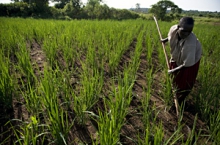 Namati, in partnership with the International Development Law Organization, the Sustainable Development Institute, Centro Terro Viva, and the Land and Equity Movement in Uganda, has released ‘Protecting Community Lands and Resources: Evidence from Liberia, Mozambique and Uganda.’ The report documents the experiences of 58 communities supported by the Community Land Titling Initiative with their nations’ community land registration laws.
Namati, in partnership with the International Development Law Organization, the Sustainable Development Institute, Centro Terro Viva, and the Land and Equity Movement in Uganda, has released ‘Protecting Community Lands and Resources: Evidence from Liberia, Mozambique and Uganda.’ The report documents the experiences of 58 communities supported by the Community Land Titling Initiative with their nations’ community land registration laws. Through the process, communities succeeded in addressing land disputes, improved local governance, enhanced local conservation of natural resources, and strengthened the rights of women and other marginalised groups. Based on these lessons, the report concludes that community land registration efforts should include three processes: the technical work of mapping and titling community land, the peace-building process of resolving land disputes, and the establishment or strengthening of local governance mechanisms. Moving forward, Namati will use these lessons in strengthening its Community Land Protection Program.

























